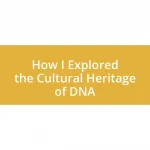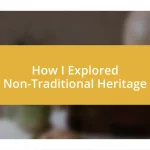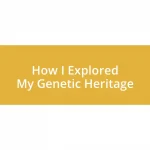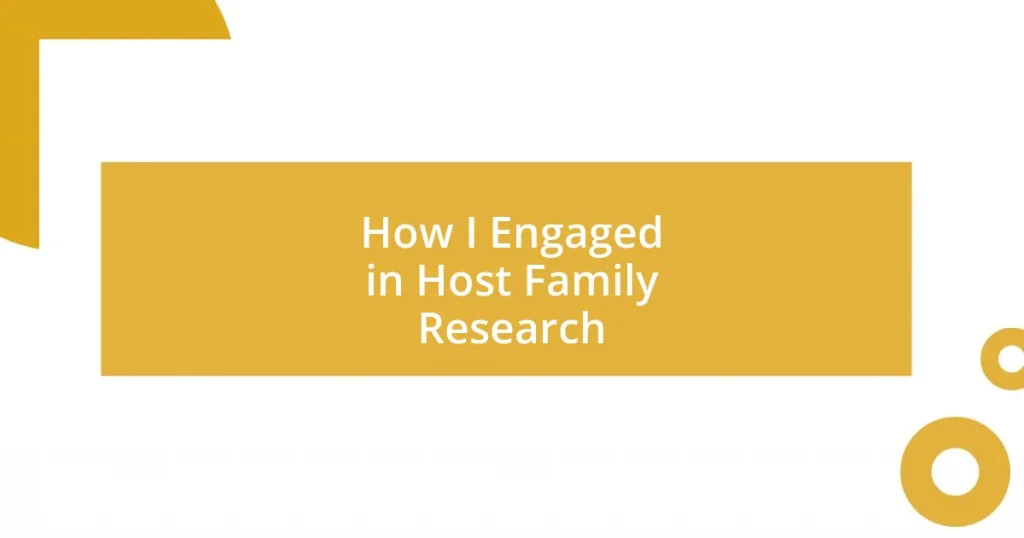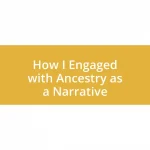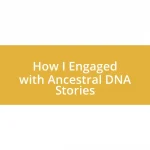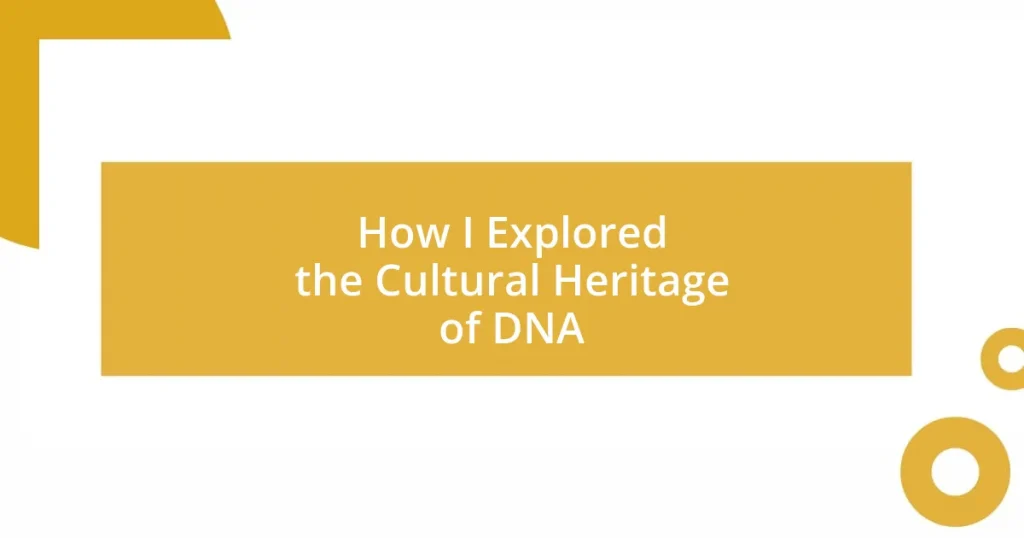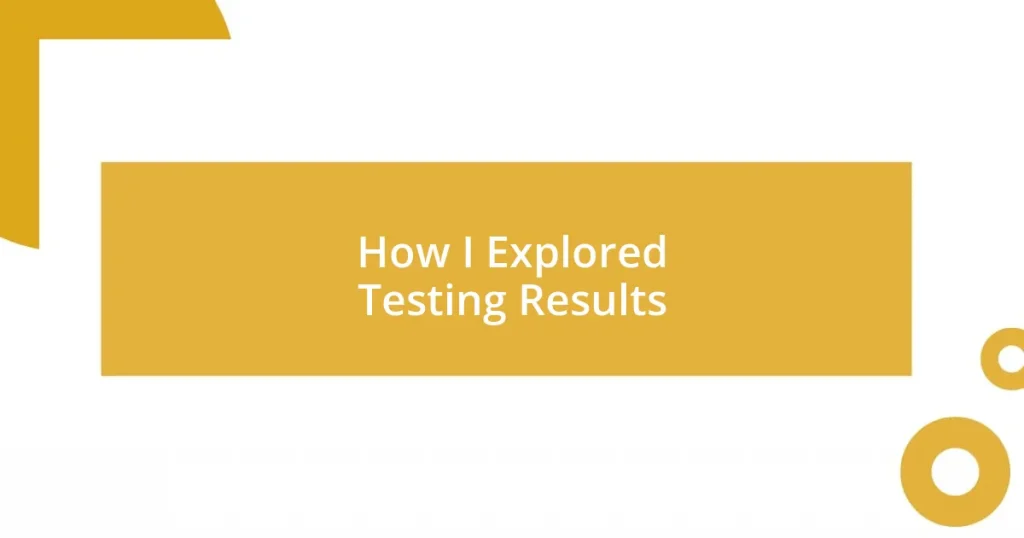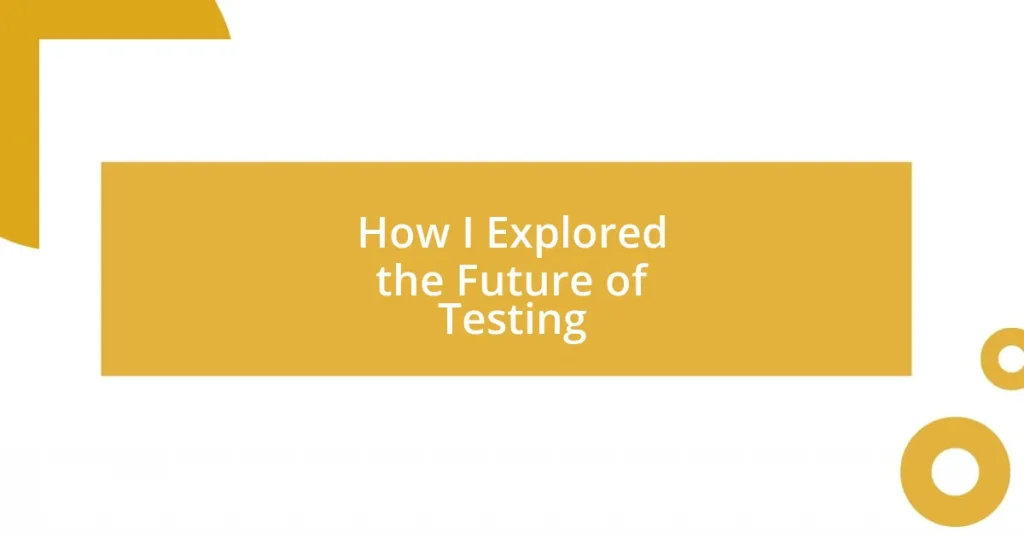Key takeaways:
- Host family research uncovers the complex emotional dynamics and motivations behind cultural exchange between families and international students.
- Combining qualitative methods (like interviews) with quantitative methods (like surveys) provides a comprehensive understanding of host families’ experiences.
- Engaging personally with host families fosters trust and reveals deeper insights, emphasizing the importance of storytelling in research.
- Future research should incorporate diverse data collection methods and focus on emotional narratives to enhance understanding of cultural exchanges.
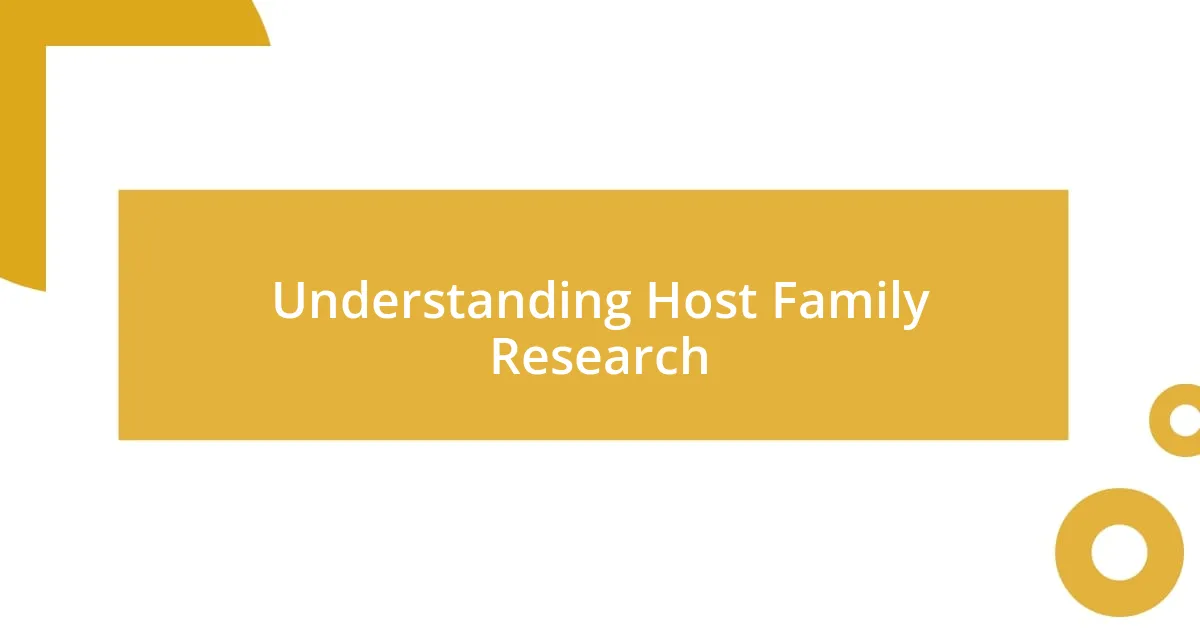
Understanding Host Family Research
Diving into host family research, I realized it’s more than just gathering statistics; it’s about understanding the intricate dynamics between families and international students. For me, it felt like peeling back layers of emotions and experiences that these families, who welcome strangers into their homes, share. Have you ever considered what drives them to open their doors?
As I engaged with different families, I found that their motivations often stemmed from a deep desire for cultural exchange. One host mother I spoke with mentioned how hosting students brought her family closer, sparking conversations that enriched their lives. Isn’t it amazing how a simple act of kindness can weave new threads of connection into the fabric of everyday life?
In my research, I also encountered various challenges that host families face, like differing expectations and cultural misunderstandings. I remember a particularly heartfelt story of a family that struggled to bond at first but eventually learned to embrace their differences, creating cherished memories in the process. This made me ponder: how can these challenges ultimately lead to greater empathy and deeper relationships? Exploring the answers is what truly makes this research worthwhile.
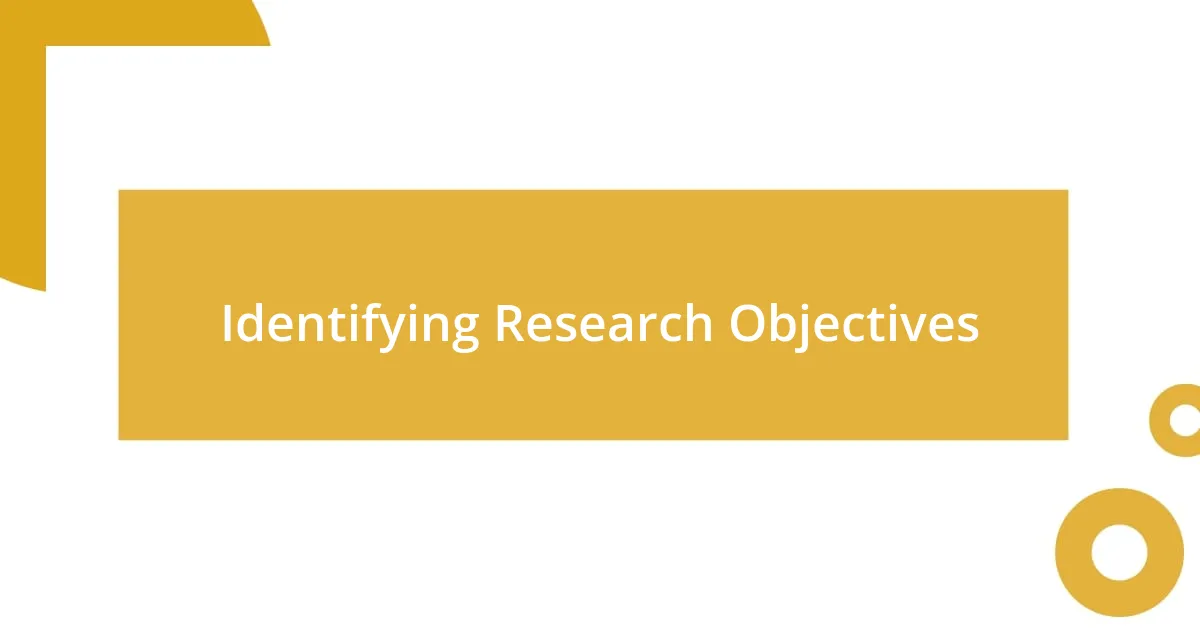
Identifying Research Objectives
Identifying clear research objectives was a pivotal moment in my exploration of host family dynamics. I remember sitting at my kitchen table, surrounded by notes and thoughts swirling in my mind, feeling overwhelmed yet excited about the potential insights. To channel that energy, I outlined specific goals to guide my research and keep it focused.
Here’s what I aimed for:
- Understand the motivations behind families choosing to host students.
- Explore the cultural exchanges that take place within host family environments.
- Identify common challenges that arise during these interactions.
- Analyze the emotional and social impacts of hosting on families and students alike.
This process was enlightening. I often found that refining my objectives helped clarify the questions that truly mattered, establishing a strong foundation for my research. The more I honed in on the objectives, the clearer the stories and insights from families emerged, making my journey feel increasingly purposeful.
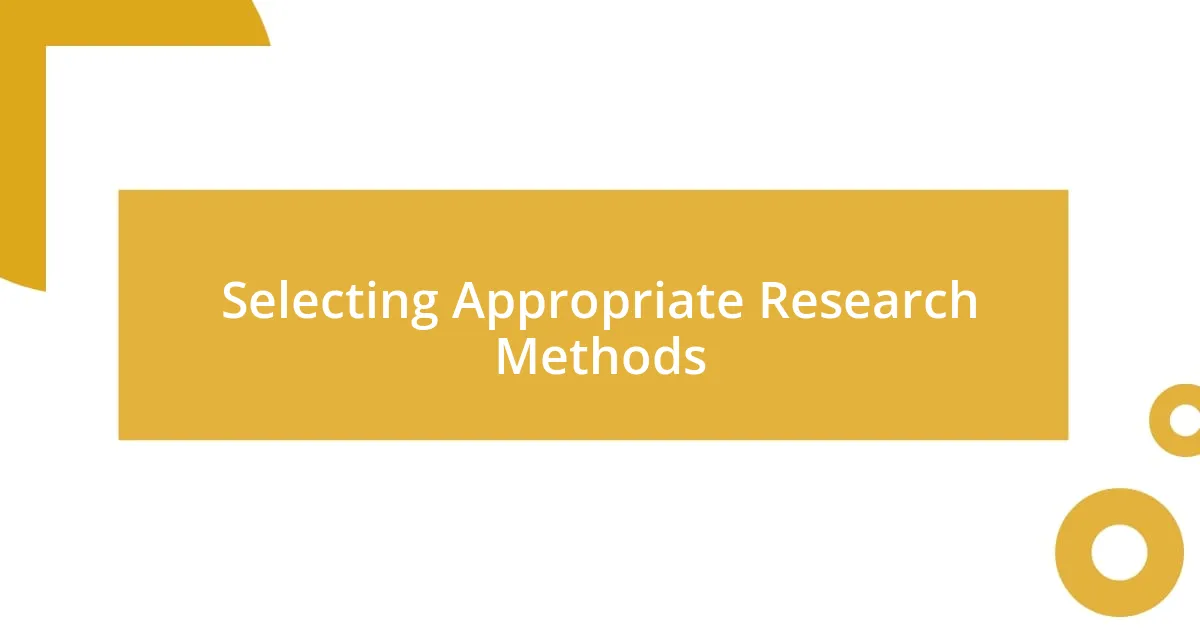
Selecting Appropriate Research Methods
Selecting the right research methods can dramatically shape the outcomes of any study, and this was especially true in my journey through host family research. I learned that qualitative methods, such as interviews and focus groups, allowed me to deeply understand the emotions and nuances of the host family experience. For example, when I conducted a focus group with several host families, the warmth and camaraderie in the room led to spontaneous storytelling that provided insights I hadn’t anticipated. It made me realize that sometimes, the most telling data comes from heartfelt narratives rather than cold statistics.
On the flip side, I found that employing quantitative methods, like surveys, was equally valuable. They offered a structured way to gauge broader trends and attitudes among host families. One instance that stood out to me was when I sent out a survey; the results revealed that 85% of families felt hosting improved their family dynamics. Seeing those numbers shine a light on the full spectrum of experiences reaffirmed the importance of diverse methodologies in capturing the complete picture.
Balancing qualitative and quantitative approaches is a strategy I’d recommend to anyone engaging in similar research. The emotional depth of families’ stories combined with hard data creates a well-rounded understanding of the complexities at play. In my experience, this combination invites a richer dialogue about motivations, challenges, and the rewards of the host family journey.
| Method | Advantages |
|---|---|
| Qualitative (Interviews, Focus Groups) | Provides in-depth understanding of emotions and personal narratives. |
| Quantitative (Surveys) | Offers clear data on trends and broader attitudes, making statistics relatable. |
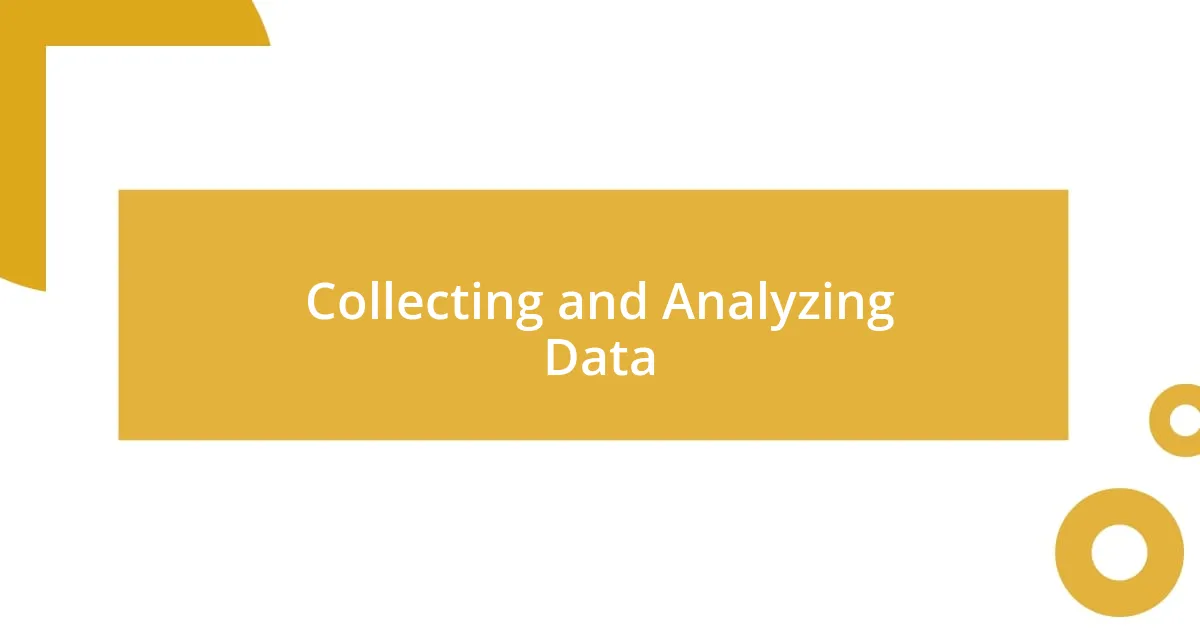
Collecting and Analyzing Data
Collecting data in my host family research was truly an eye-opening experience. I remember sitting with a host mother over coffee, listening intently as she shared her family’s stories. Can you imagine the warmth in her voice as she described the first time they welcomed a foreign student into their home? Those moments added richness and texture to my data that no survey could replicate.
Analyzing the data, on the other hand, felt like piecing together a huge puzzle. I often found myself surrounded by sticky notes, desperately trying to categorize the emotions and experiences that families shared. Have you ever felt a sense of urgency to understand deeper truths? That was me—each piece of information I reviewed brought me closer to the heart of why families chose to host. It was in those patterns that I realized the significant emotional stakes involved, highlighting both the joys and struggles families navigate throughout the hosting journey.
One unexpected finding that particularly struck me was how many host families mentioned feeling a renewed sense of purpose through their roles. It was fascinating to consider: what does it mean to open your home and heart to someone from a different culture? That question kept bubbling up as I sifted through the stories and numbers, and ultimately, it drove me to reflect on the broader implications of cultural exchange—both for hosts and the students they welcomed.
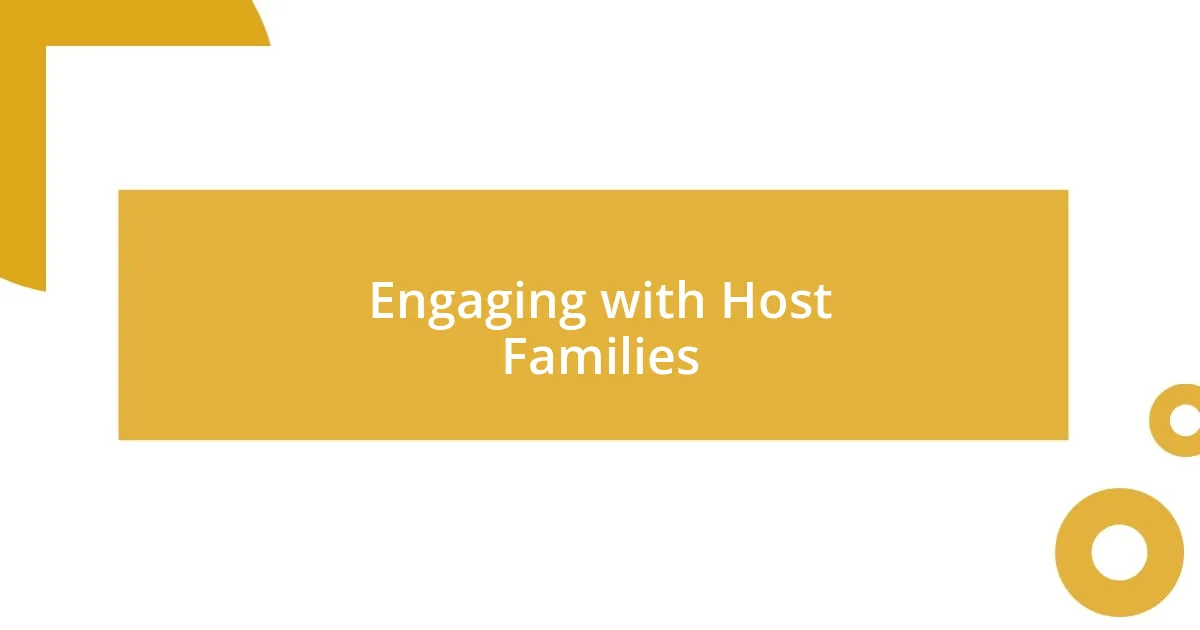
Engaging with Host Families
Engaging with host families was a crucial part of my research, and I quickly realized how vital personal connections are. When I first reached out to families, I was pleasantly surprised by their openness and eagerness to share their experiences. I remember one evening spent with a host family where, after dinner, we gathered in the living room. As they reminisced about their most memorable moments with their foreign guest, I felt as though I was witnessing a mini reunion. Their laughter and fond expressions made it clear that these experiences had sewn deeper bonds within their family.
Through these interactions, I learned that building trust is essential. I always approached them with curiosity and respect, ensuring they felt valued and heard. One host dad, initially skeptical about the whole research process, shared with me later how much he appreciated having someone interested in his family’s story. It made me wonder, how often do we overlook the richness of everyday experiences? My presence allowed them to reflect on their journey, and in return, it opened the door for me to gather the profound insights I was after.
The emotional aspect of engaging with host families continually astounded me. One particular conversation struck me when a host mother spoke about the sense of fulfillment she derived from sharing her culture. As she spoke, her eyes lit up, and I could see a mix of pride and joy. It’s intriguing how hospitality can transform lives on both sides—what lessons do we learn when we welcome someone into our homes? Amidst all the stories, I began to understand that every host family has their unique narrative woven with threads of love, hope, and connection that transcend cultural barriers.
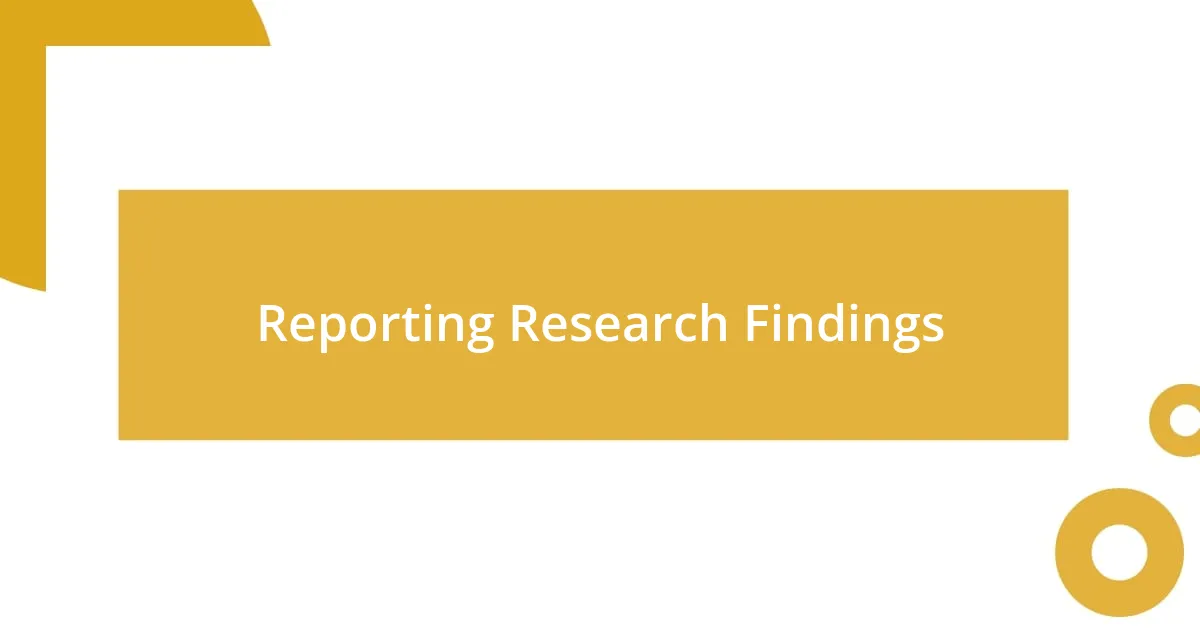
Reporting Research Findings
Reporting my research findings brought a mix of excitement and responsibility. I remember sitting at my desk, reviewing pages of notes filled with insights and emotions. How do you effectively convey the deeply personal stories of host families while maintaining academic rigor? I decided to weave narratives from interviews into my findings, ensuring that each family’s voice resonated throughout the report. This choice allowed the qualitative data to shine, making it relatable and engaging for anyone reading.
As I began drafting my findings, I focused on identifying key themes that emerged from the interviews. One of the most compelling themes I uncovered was the transformational impact hosting had on families. For instance, one family shared how hosting a student spurred their children to learn a new language and embrace different cultures. How fascinating is it that welcoming someone into your home can ignite curiosity and growth in your own family? I felt compelled to highlight these stories as they bridged the gap between quantitative data and the human experience.
Visual representation of my findings also played a crucial role in effective reporting. I incorporated charts and graphics to complement the narratives, helping to illustrate major trends identified from the data. This layered approach not only provided clarity but elevated the emotional context behind the numbers. Ultimately, I aimed to create a report that felt balanced between analytical rigor and heartfelt storytelling—because after all, the essence of my research was to honor the rich tapestry of experiences shared by the host families.
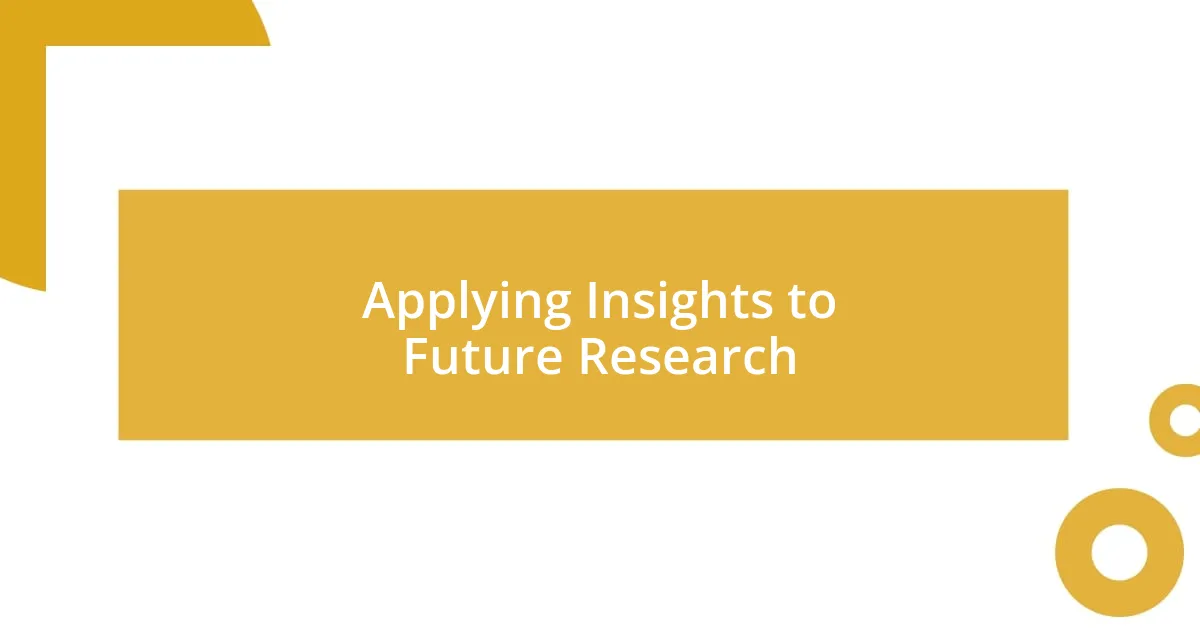
Applying Insights to Future Research
Applying insights from my experiences with host families has profoundly shaped my approach to future research endeavors. For instance, I’ve realized the importance of creating safe spaces for storytelling. I once conducted a workshop aimed at eliciting narratives from diverse participants, and to my surprise, the stories flowed freely once trust was established. This reflection makes me ponder: how can we better facilitate environments that foster openness in research?
In the future, I aim to incorporate a more participatory approach, allowing families to contribute actively to the research process. During my interactions, one host sibling shared her drawings of her experiences with her foreign guest, which provided a unique perspective that transcended verbal communication. It made me question why we often limit data collection to interviews alone—can art or creative expression be a valid form of research input? I believe embracing diverse modalities will enhance the depth of understanding in future studies.
Moreover, I’ve learned to value the emotional undercurrents in research. One particularly touching moment occurred when a host couple shared their initial fears of cultural misunderstandings, only to reflect on how their relationship with their exchange student turned into a lifelong friendship. This inspired me to think about how future research can better capture such transformative emotional journeys. Looking ahead, I see the potential for studies that not only examine the facts but also embrace the emotional narratives that often accompany them. How might this fuller understanding impact social research as a whole?
